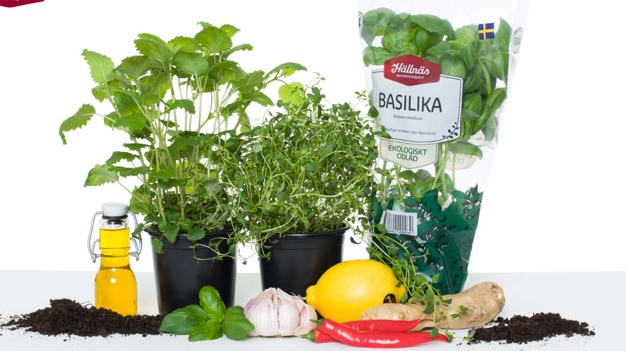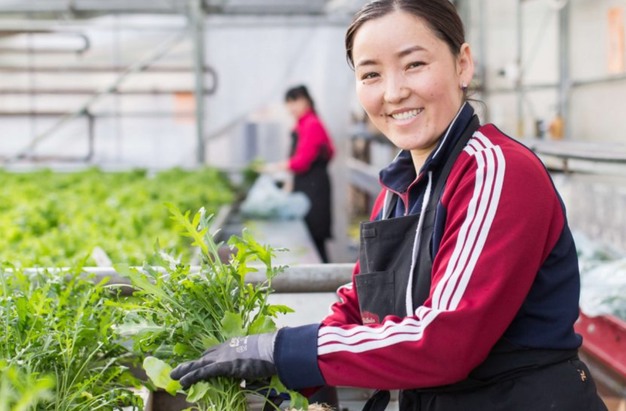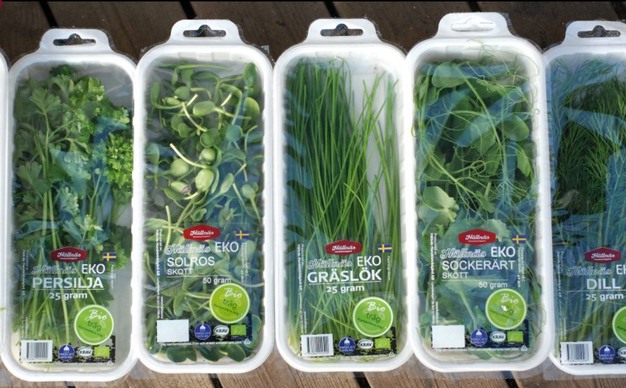
The commercial garden, Hällnäs Handelsträdgård, is located in the north of Sweden. It lies between the town of Lycksele and the city of Umeå. Their greenhouses are no larger than 50,000m2. Year-round cultivation is done in these. Björn Isacsson's father began growing flowers here in 1953. Björn was raised in the greenhouses. He went on to study horticulture at the Swedish Agricultural University.
At Hällnäs, it will soon be time to grow violets for the spring. Flower cultivation is still a top priority for this company. However, in 2000, Isacsson started growing lettuce and fresh herbs - from traditional dill to the popular basil.
For the plants' development and quality, water and nutrition are more important than light. Isacsson says, "We now have LED lighting, which emits twice as much light, while our electricity usage has decreased by 40 to 60%."
"We are now experimenting with choosing different light spectrums. We want to find the perfect range for each plant. The herbs can become more flavorsome if you can adjust their light's wavelengths. This wavelength can be different for, for example, thyme and basil."

Cultivation climate
How climate-friendly is glasshouse horticulture in Northern Sweden? "Most of the glasshouse horticulture in Sweden has switched to bio-fuels or heat pumps. We have invested in a huge pellet stove that supports our cultivation. The LED lighting I mentioned earlier is also a big step in the right direction," says Isacsson.
In Sweden, four large companies grow lettuce and herbs - Hällnäs, Orto Novo, Spisa, and Svegro. They collaborate on sustainability issues. These include energy and water usage technology as well as minimizing long journeys.

All these companies comply with KRAV certification and farm pesticide-free. Each one of them recycles their water too. Compared to, for instance, outside farming in Spain, that means water savings of up to 95%.
Irrigation water gets recirculated. Excess nutrients are, therefore, not released into the soil or water. They are all used. At Hällnäs, they have replaced as much plastic packaging with cardboard as possible. They also grow their products in turf, paper, or recycled plastic pots, rather than plastic ones.
Organic farming
"I switched to organic farming in 2007. And I have never regretted it. We, as lettuce and herb growers, are very proud that we can supply everyone in Sweden. Together, we supply 100% of our crops to all the supermarkets in the country. We, therefore, do not have to import any fresh herbs," explains Björn.
It is also important to find smart solutions for deliveries. "We work with (a local dairy co-operative) Norrmejerier. That means our herbs, flowers, and lettuce goes to the stores with their dairy truck. In this way, even the smaller supermarkets can buy-in fresh produce multiple times a week. Wastage is reduced, and everyone gets fresh products."
First cucumbers in week 10
When asked what Hällnäs's spring plans are, Isacsson answers, "We have already started with our cucumber cultivation. These are growing well at the moment. We can start harvesting in week ten already. The organic plants we sell to hobby farmers also form an important part of this."
"A quite new concept is a sixpack with different lettuce varieties. These are easy to plant and can be harvested within a few short weeks. Lastly, we have started growing sweet potato seedlings too. We are also experimenting with chillies in hanging pots," concludes Isacsson.
For more information, visit www.hallnas.nu
Source: mynewsdesk.com
